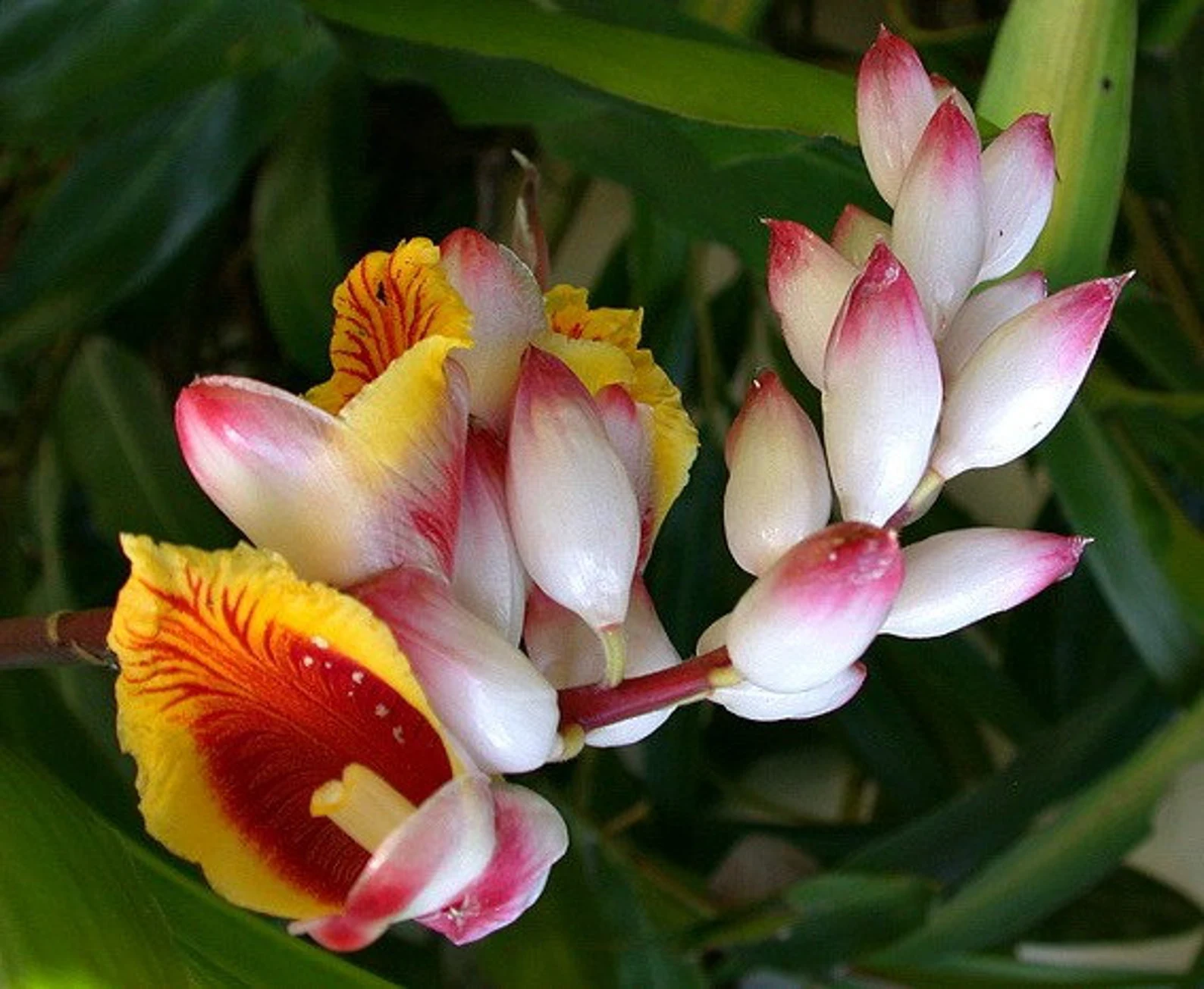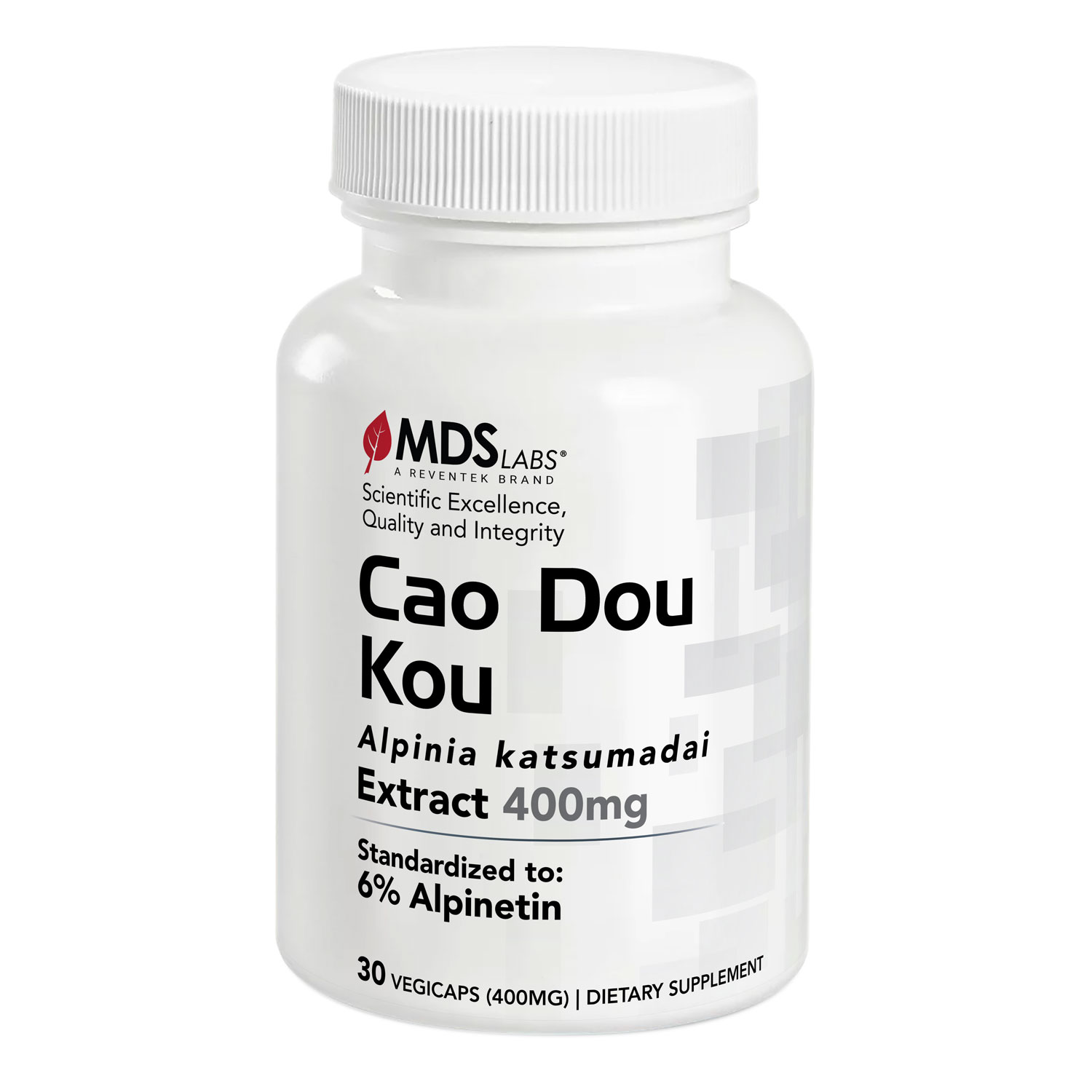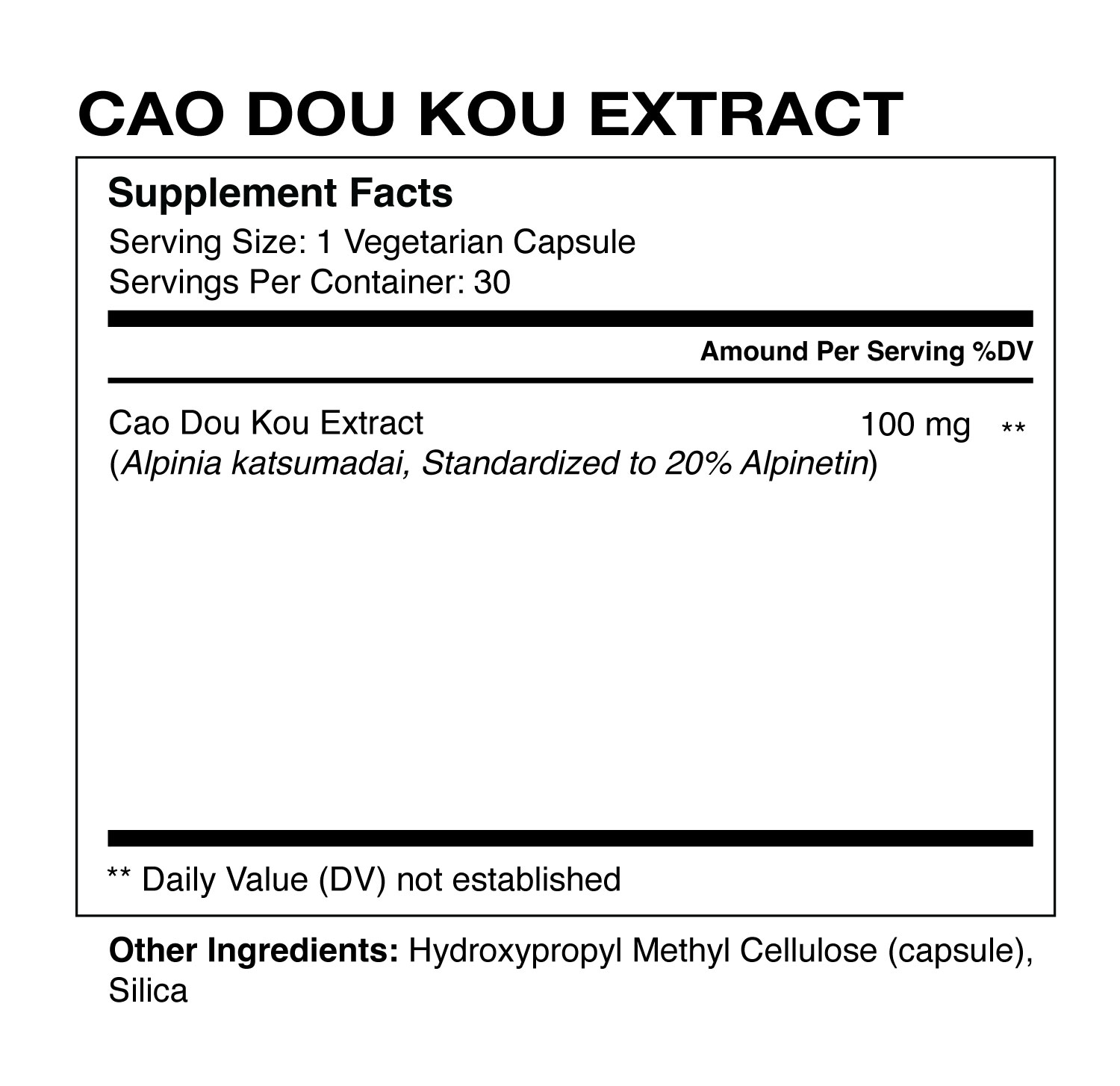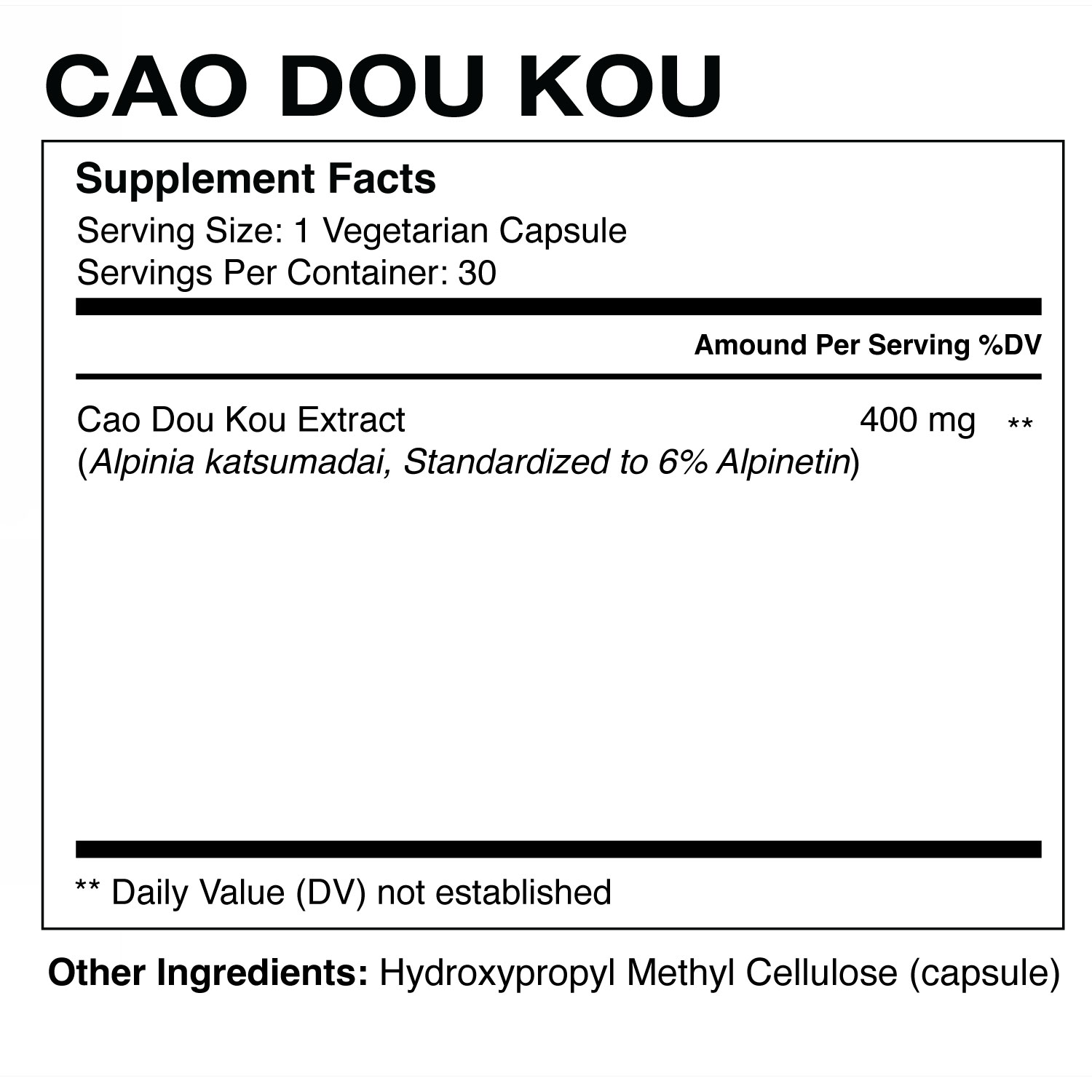Cao Dou Kou
Alpinia katsumadai Extract
(6% Alpinetin)
400mg Capsules
- Includes 400mg per capsule of Cao Dou Kou Extract (Alpinia katsumadai)
- Standardized to 6% Alpinetin
- Traditionally used to treat digestive disorders and respiratory issues*
- Natural, Gluten Free, Vegan, Non-GMO
- Includes 30 Capsules
- Free US Shipping
Potential for Anti-Aging and Health Benefits*
Alpinia katsumadai has been used for thousands of years in traditional Chinese medicine, known as Cao Dou Kou or Katsumadai Ginger. Several compounds found in Alpinia katsumadai, specifically Alpinetin and EMC, are thought to have significant anti-aging potential.*
In a 2023 review of Alpinetin's pharmacological and pharmacocokinetic properties, it demonstrated signal transduction ability for phosphoinosmde-3-kinase (PI3K), protein kinase B (AKT), and mTOR, target of Rapamycin, through in vitro testing of human cell lines. [1] Please note that in vitro studies are not indicative of success in human clinical trials. Rapamycin is the only known compound that consistently demonstrates the ability to increase mammalian longevity in clinical trials [2]. The target of Rapamycin is the mTOR pathway, a signaling system responsible for cell growth, metabolism, and survival. It is now believed that mTOR is also substantially inhibited by Alpinetin found in Alpinia katsumadai.* [3]

Alpinetin: A Compound with Remarkable Potential*
Alpinetin’s anticancer activities have been described as noteworthy, influencing apoptosis, cell cycle arrest, and metastasis across various cancer cell lines via pathways such as ROS/NF-κB/HIF-1α, PI3K/Akt/mTOR (Rapamycin target), and STAT3/c-Myc/survivin.[1] Its anti-inflammatory effects are mediated through mechanisms including PI3K/Akt, TLR4/NF-κB, and ERK/JNK/p38 MAPK inhibition, showcasing substantial efficacy in diverse inflammatory models.[1] Moreover, Alpinetin’s hepatoprotective, cardiovascular protective, antimicrobial, antiviral, antioxidant, and DNA/protein interaction capabilities further promote its potential as a multi-target drug candidate.* [1]
Research has shown that Alpinetin’s potential anti-aging properties might come from its reported ability to inhibit STAT3 and ERK. [1] The STAT3 protein transmits signals for the maturation of immune system cells. It is considered a major intrinsic pathway for cancer inflammation, owing to its frequent activation in malignant cells. It was highlighted in the 2023 review that Alpinetin can downregulate cyclin-D1 in vitro, a pathway also inhibited by Dasatinib.* [1]. Dasatinib and Quercetin when combined have recently garnered headlines as a breakthrough senolytic treatment known as D+Q.*

Although animal studies are not indicative of seeing similar results in humans, there is still significant scientific value that can be gained from them. In 2011, it was found that Alpinia katsumadai seed extract provided significant neuroprotective qualities in a gerbil model of ischemic damage, which was further supported in a previous study on Chinese hamster lung fibroblasts. The group treated with Alpinia katsumadai had significantly increased BDNF immunoreactivity in the CA region after 12 hours post-ischemia, compared to the control group. BDNF, a neurotrophic factor, has been associated with neuronal survival, synaptic plasticity, learning and memory, in addition to neuronal plasticity. [4]

Enhancing Bone Health through regulation of apoptotic signaling, mapk and alp activities*
In a 2020 study, it was shown that (E)-methyl-cinnamate (EMC) isolated from Alpinia Katsumadai increases cell apoptosis, and decreases cell migration and osteoblast differentiation, through the regulation of apoptotic signaling, and MAPKs and ALP activities in pre-osteoblasts (precursor to cells that form new bones and grow and repair existing ones) in vitro. Their data suggests that EMC might be a useful phytotherapeutic compound to improve abnormalities of osteoblast function in bone disease.* [5]
improving Metabolic Function by activating ppar*
Alpinetin was demonstrated to be a powerful activator of PPAR (Peroxisome proliferator-activated receptors) in vitro.* [6] These are a family of nuclear receptors that regulate energy homeostasis and metabolic function. PPAR activators are believed to contribute to:
- Improve cardiovascular risk factors by reducing triglycerides and VLDL particles, increasing HDL cholesterol, and inhibiting foam cell formation.*
- Reduce the risk of acute myocardial infarction, stroke, or heart failure. *
- Reduce insulin resistance and blood glucose levels, and improve cognitive and functional abilities in diabetic individuals with mild Alzheimer's disease.*
- Have anti-inflammatory effects in vascular smooth muscle cells, monocyte/macrophages, endothelial cells, and adipocytes. *
- Suppress macrophage-derived inflammation. PPARα activation can improve immunity in PD-1 blockade malignancy immunotherapy by reprogramming CD8+ T-cell metabolism. *
ATTENTION:
If pregnant, nursing, or trying to conceive, do not use this product. If you take medications, have preexisting conditions, or suffer from allergies of any kind, please consult your physician before taking this, or any other dietary supplements. The information contained on this site has not been evaluated by the Food and Drug Administration.
* These statements have not been evaluated by the Food and Drug Administration.
These products are not intended to diagnose, treat, cure, or prevent any disease.
Please be aware that findings from animal studies and research on human cell lines may not necessarily reflect outcomes observed in humans. We encourage you to do your own research, and consult your physician before taking this or any other dietary supplements.
ABOUT MDS LABS

CITATIONS:
[1] Zhao G, Tong Y, Luan F, Zhu W, Zhan C, Qin T, An W, Zeng N. Alpinetin: A Review of Its Pharmacology and Pharmacokinetics. Front Pharmacol. 2022 Feb 4;13:814370. doi: 10.3389/fphar.2022.814370. PMID: 35185569; PMCID: PMC8854656.
https://www.ncbi.nlm.nih.gov/pmc/articles/PMC8854656/
[2] Zelton Dave Sharp, Randy Strong, Rapamycin, the only drug that has been consistently demonstrated to increase mammalian longevity. An update, Experimental Gerontology, Volume 176, 2023, 112166, ISSN 0531-5565, https://doi.org/10.1016/j.exger.2023.112166.?
https://www.sciencedirect.com/science/article/pii/S0531556523000876
[3] Xiaohui Y, Jian W, Li C, Yuxi Z, Jianlin H, Minghua L. Active compounds of Caodoukou () inhibit the migration, invasion and metastasis of human pancreatic cancer cells by targeting phosphoinosmde-3-kinase/ protein kinase B/mammalian target of rapamycin pathway. J Tradit Chin Med. 2023 Oct;43(5):876-886. doi: 10.19852/j.cnki.jtcm.20230802.004. PMID: 37679975; PMCID: PMC10465845.
https://www.ncbi.nlm.nih.gov/pmc/articles/PMC10465845/
[4] Li H, Park JH, Yan B, Yoo KY, Lee CH, Choi JH, Hwang IK, Won MH. Neuroprotection of Alpinia katsumadai Seed Extract against Neuronal Damage in the Ischemic Gerbil Hippocampus is Linked to Altered Brain-Derived Neurotrophic Factor. Lab Anim Res. 2011 Mar;27(1):67-71. doi: 10.5625/lar.2011.27.1.67. Epub 2011 Mar 25. PMID: 21826164; PMCID: PMC3145989.
https://www.ncbi.nlm.nih.gov/pmc/articles/PMC3145989/
[5] Park KR, Lee H, Cho M, Yun HM. A Phytochemical Constituent, (E)-Methyl-Cinnamate Isolated from Alpinia katsumadai Hayata Suppresses Cell Survival, Migration, and Differentiation in Pre-Osteoblasts. Int J Mol Sci. 2020 May 24;21(10):3700. doi: 10.3390/ijms21103700. PMID: 32456334; PMCID: PMC7279157.
https://www.ncbi.nlm.nih.gov/pmc/articles/PMC7279157/
[6] Hu K, Yang Y, Tu Q, Luo Y, Ma R. Alpinetin inhibits LPS-induced inflammatory mediator response by activating PPAR-γ in THP-1-derived macrophages. Eur J Pharmacol. 2013 Dec 5;721(1-3):96-102. doi: 10.1016/j.ejphar.2013.09.049. Epub 2013 Oct 5. PMID: 24104193.
https://pubmed.ncbi.nlm.nih.gov/24104193/
Cao Dou Kou
Alpinia katsumadai Extract
(6% Alpinetin)
400mg Capsules
Includes 400mg per capsule of Cao Dou Kou Extract (Alpinia katsumadai)- Standardized to 6% Alpinetin
- Traditionally used to treat digestive disorders and respiratory issues*
- Natural, Gluten Free, Vegan, Non-GMO
- Includes 30 Capsules
- Free US Shipping
Potential for Anti-Aging and Health Benefits*
Alpinia katsumadai has been used for thousands of years in traditional Chinese medicine, known as Cao Dou Kou or Katsumadai Ginger. Several compounds found in Alpinia katsumadai, specifically Alpinetin and EMC, are thought to have significant anti-aging potential.*
In a 2023 review of Alpinetin’s pharmacological and pharmacocokinetic properties, it demonstrated signal transduction ability for phosphoinosmde-3-kinase (PI3K), protein kinase B (AKT), and mTOR, target of Rapamycin, through in vitro testing of human cell lines. [1] Please note that in vitro studies are not indicative of success in human clinical trials. Rapamycin is the only known compound that consistently demonstrates the ability to increase mammalian longevity in clinical trials [2]. The target of Rapamycin is the mTOR pathway, a signaling system responsible for cell growth, metabolism, and survival. It is now believed that mTOR is also substantially inhibited by Alpinetin found in Alpinia katsumadai.* [3]

Alpinetin: A Compound with Remarkable Potential*
Alpinetin’s anticancer activities have been described as noteworthy, influencing apoptosis, cell cycle arrest, and metastasis across various cancer cell lines via pathways such as ROS/NF–κB/HIF-1α, PI3K/Akt/mTOR (Rapamycin target), and STAT3/c–Myc/survivin.[1] Its anti-inflammatory effects are mediated through mechanisms including PI3K/Akt, TLR4/NF-κB, and ERK/JNK/p38 MAPK inhibition, showcasing substantial efficacy in diverse inflammatory models.[1] Moreover, Alpinetin’s hepatoprotective, cardiovascular protective, antimicrobial, antiviral, antioxidant, and DNA/protein interaction capabilities further promote its potential as a multi-target drug candidate.* [1]
Research has shown that Alpinetin’s potential anti-aging properties might come from its reported ability to inhibit STAT3 and ERK. [1] The STAT3 protein transmits signals for the maturation of immune system cells. It is considered a major intrinsic pathway for cancer inflammation, owing to its frequent activation in malignant cells. It was highlighted in the 2023 review that Alpinetin can downregulate cyclin-D1 in vitro, a pathway also inhibited by Dasatinib.* [1]. Dasatinib and Quercetin when combined have recently garnered headlines as a breakthrough senolytic treatment known as D+Q.*

Although animal studies are not indicative of seeing similar results in humans, there is still significant scientific value that can be gained from them. In 2011, it was found that Alpinia katsumadai seed extract provided significant neuroprotective qualities in a gerbil model of ischemic damage, which was further supported in a previous study on Chinese hamster lung fibroblasts. The group treated with Alpinia katsumadai had significantly increased BDNF immunoreactivity in the CA region after 12 hours post-ischemia, compared to the control group. BDNF, a neurotrophic factor, has been associated with neuronal survival, synaptic plasticity, learning and memory, in addition to neuronal plasticity. [4]

Enhancing Bone Health through regulation of apoptotic signaling, mapk and alp activities*
In a 2020 study, it was shown that (E)-methyl-cinnamate (EMC) isolated from Alpinia Katsumadai increases cell apoptosis, and decreases cell migration and osteoblast differentiation, through the regulation of apoptotic signaling, and MAPKs and ALP activities in pre-osteoblasts (precursor to cells that form new bones and grow and repair existing ones) in vitro. Their data suggests that EMC might be a useful phytotherapeutic compound to improve abnormalities of osteoblast function in bone disease.* [5]
improving Metabolic Function by activating ppar*
Alpinetin was demonstrated to be a powerful activator of PPAR (Peroxisome proliferator-activated receptors) in vitro.* [6] These are a family of nuclear receptors that regulate energy homeostasis and metabolic function. PPAR activators are believed to contribute to:
- Improve cardiovascular risk factors by reducing triglycerides and VLDL particles, increasing HDL cholesterol, and inhibiting foam cell formation.*
- Reduce the risk of acute myocardial infarction, stroke, or heart failure. *
- Reduce insulin resistance and blood glucose levels, and improve cognitive and functional abilities in diabetic individuals with mild Alzheimer’s disease.*
- Have anti-inflammatory effects in vascular smooth muscle cells, monocyte/macrophages, endothelial cells, and adipocytes. *
- Suppress macrophage-derived inflammation. PPARα activation can improve immunity in PD-1 blockade malignancy immunotherapy by reprogramming CD8+ T-cell metabolism. *
ATTENTION:
If pregnant, nursing, or trying to conceive, do not use this product. If you take medications, have preexisting conditions, or suffer from allergies of any kind, please consult your physician before taking this, or any other dietary supplements. The information contained on this site has not been evaluated by the Food and Drug Administration.
* These statements have not been evaluated by the Food and Drug Administration.
These products are not intended to diagnose, treat, cure, or prevent any disease.
Please be aware that findings from animal studies and research on human cell lines may not necessarily reflect outcomes observed in humans. We encourage you to do your own research, and consult your physician before taking this or any other dietary supplements.
ABOUT MDS LABS

CITATIONS:
[1] Zhao G, Tong Y, Luan F, Zhu W, Zhan C, Qin T, An W, Zeng N. Alpinetin: A Review of Its Pharmacology and Pharmacokinetics. Front Pharmacol. 2022 Feb 4;13:814370. doi: 10.3389/fphar.2022.814370. PMID: 35185569; PMCID: PMC8854656.
https://www.ncbi.nlm.nih.gov/pmc/articles/PMC8854656/
[2] Zelton Dave Sharp, Randy Strong, Rapamycin, the only drug that has been consistently demonstrated to increase mammalian longevity. An update, Experimental Gerontology, Volume 176, 2023, 112166, ISSN 0531-5565, https://doi.org/10.1016/j.exger.2023.112166.?
https://www.sciencedirect.com/science/article/pii/S0531556523000876
[3] Xiaohui Y, Jian W, Li C, Yuxi Z, Jianlin H, Minghua L. Active compounds of Caodoukou () inhibit the migration, invasion and metastasis of human pancreatic cancer cells by targeting phosphoinosmde-3-kinase/ protein kinase B/mammalian target of rapamycin pathway. J Tradit Chin Med. 2023 Oct;43(5):876-886. doi: 10.19852/j.cnki.jtcm.20230802.004. PMID: 37679975; PMCID: PMC10465845.
https://www.ncbi.nlm.nih.gov/pmc/articles/PMC10465845/
[4] Li H, Park JH, Yan B, Yoo KY, Lee CH, Choi JH, Hwang IK, Won MH. Neuroprotection of Alpinia katsumadai Seed Extract against Neuronal Damage in the Ischemic Gerbil Hippocampus is Linked to Altered Brain-Derived Neurotrophic Factor. Lab Anim Res. 2011 Mar;27(1):67-71. doi: 10.5625/lar.2011.27.1.67. Epub 2011 Mar 25. PMID: 21826164; PMCID: PMC3145989.
https://www.ncbi.nlm.nih.gov/pmc/articles/PMC3145989/
[5] Park KR, Lee H, Cho M, Yun HM. A Phytochemical Constituent, (E)-Methyl-Cinnamate Isolated from Alpinia katsumadai Hayata Suppresses Cell Survival, Migration, and Differentiation in Pre-Osteoblasts. Int J Mol Sci. 2020 May 24;21(10):3700. doi: 10.3390/ijms21103700. PMID: 32456334; PMCID: PMC7279157.
https://www.ncbi.nlm.nih.gov/pmc/articles/PMC7279157/
[6] Hu K, Yang Y, Tu Q, Luo Y, Ma R. Alpinetin inhibits LPS-induced inflammatory mediator response by activating PPAR-γ in THP-1-derived macrophages. Eur J Pharmacol. 2013 Dec 5;721(1-3):96-102. doi: 10.1016/j.ejphar.2013.09.049. Epub 2013 Oct 5. PMID: 24104193.
https://pubmed.ncbi.nlm.nih.gov/24104193/



Max –
Hard to find product, but expensive
Brian –
Completed my first month. Many supplements I take I don’t really notice anything, but this one gives me more energy and focus. My breathing feels easier and I have less pain throughout the day. When I forget to take it’s noticeable.